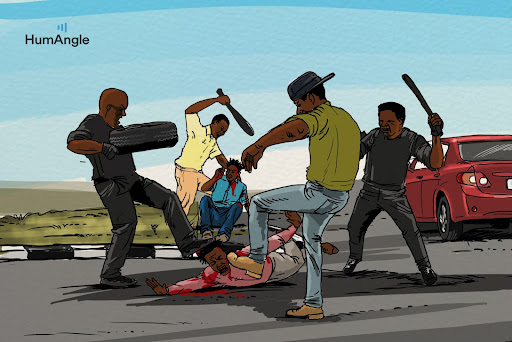‘Inefficient’ Judicial System; Mob Violence Persists In Nigeria
Nigeria is plagued with a myriad of social vices, including jungle justice, a problem that infringes on fundamental rights of citizens due to the failure of the country’s judicial system.

“Ole, ole!” (thief, thief!)
“Stone him!”
“Kill him!”
The above are sometimes all that need to be screamed in Nigeria for a large crowd to beat a crime suspect to stupor or burn him alive, with overzealous youths taking pictures and videos for social media audiences.
Even when many Nigerians are aware that the inhumane crime is against the provisions of chapter 4 of the 1999 constitution of the Federal Republic of Nigeria which emcompasses fundamental rights, including right to life, right to human dignity, and the right to fair hearing, lack of trust in the country’s justice system gives room for the irregularity.
Unfortunately, when an individual is unjustly killed, a family might have lost a breadwinner, a father, husband, son or mother, sister, daughter, wife among others. Meanwhile, the killers are at large and might not be ascertained.
Since many perpetrators of jungle justice go unpunished, the lawlessness continues.
Anarchy rules
On Oct. 5, 2012, four students of the University of Port Harcourt, Rivers State, South-south Nigeria, left their campus for Aluu village to receive a debt they were being owed. Within minutes of their arrival, a rumour spread that the students were in the community to steal.
In the blink of an eye, an enraged mob stripped them naked, wrapped car tyres around their necks, sprayed them with gasoline, and burned them to death. Following public outrage that followed the incident, 12 people were arrested and three, including a police officer, sentenced to death.
In another report published on Nov. 17, 2016, nine people were burnt alive in Northwest Zamfara State for insulting Prophet Muhammad. Also, a commercial motocylist was lynched by a mob in Southeast Ebonyi for the alleged theft of a motorcyle.
On Dec. 15, 2016, some thugs killed the Zonal Head of the Lagos State Traffic Management Authority (LASTMA) in Southwest Lagos, Bakare Olatunji, following the death of a motor boy knocked down by the agency’s van that was chasing some violators of the Lagos traffic law.
The situation was the same on Jan. 24, 2021 when three people lynched a 23-year-old man to death for allegedly stealing two mobile phones in Southwest Ogun State. Children have also in the past been victims of mob violence as a seven-year-old boy was burnt dead on Nov. 15, 2015 for attempting to steal garri from a trader.
“Inefficient judicial system causing jungle justice”
Nigerians who spoke with HumAngle argued that inefficient judicial system and lack of trust in law enforcement agencies are the reason jungle justice persists in Nigeria.
The track road to attain justice is a long one consisting of the police, courts, the state prosecution team, and the Nigeria Prison Service now known as the Correctional Service Commission.
Some citizens have, however, lost hope because of the disregard for the rule of law by some influential persons in society who connive with the police or court to free notorious crime suspects, thereby rendering the justice system inefficient.
Mayowa Isaac told our reporter that “the system cannot guarantee justice and that is why people take laws into their own hands. The judicial system is marred with corruption to the extent that notorious criminals that I know on my street walk freely and they sometimes boast that they know how to manoeuvre their way out of police detentions.”
Yemi Azeez, a lawyer, said the Nigerian society has failed to apply uniform standards of justice to every citizen, hence, many do carry out jungle justice to express their displeasure against the country’s dysfunctional system with slow, dying and unproductive judiciary.
To curb the challenges, the lawyer called for the overhaul of the judicial system, saying there is a need for accelerated hearing of all manners of cases in courts to rebuild trust of citizens in the judicial system.
“We must redefine our values as a people and make sure there is respect for the rule of law during the trial of the accused,” he said.
HumAngle understands that the problem of jungle justice is not limited to Nigeria as there are instances of mob violence in the western world. Just recently, India pushed for a new protection Act against lynching. With the law, mob violence has become a non-bailable offence and punishable by a maximum of life imprisonment.
The law also compels security personnel to intervene without delay anytime such occurs and failure to do so would result in discharge and punishment for dereliction of duty.
Support Our Journalism
There are millions of ordinary people affected by conflict in Africa whose stories are missing in the mainstream media. HumAngle is determined to tell those challenging and under-reported stories, hoping that the people impacted by these conflicts will find the safety and security they deserve.
To ensure that we continue to provide public service coverage, we have a small favour to ask you. We want you to be part of our journalistic endeavour by contributing a token to us.
Your donation will further promote a robust, free, and independent media.
Donate HereStay Closer To The Stories That Matter




